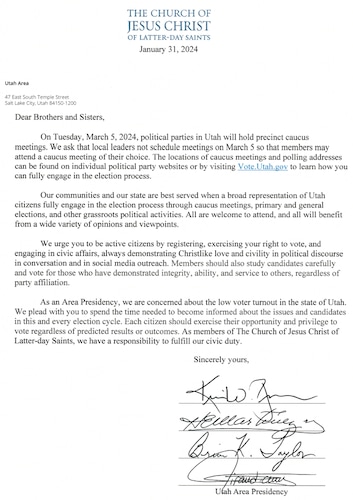Latter-day Saint leaders are pleading with Utah church members to not only show up at their precinct caucus meetings March 5, but also to do their homework ahead of time on the issues and candidates and to vote this election season for “those who have demonstrated integrity, ability and service to others, regardless of party affiliation.”
Signed by the Utah Area Presidency of The Church of Jesus Christ of Latter-day Saints, the document, dated Jan. 31, was distributed to local lay leaders, who were tasked with sharing it with their congregations.

A statement signed by the Utah Area Presidency of The Church of Jesus Christ of Latter-day Saints calls on Utah believers to participate at all stages in the political process, specifically urging turnout in March precinct caucuses.
The letter appears, scholars said, to be an effort to contain polarization within Utah’s politics.
In many ways, the January statement reflects one issued by the faith’s governing First Presidency in June 2023 discouraging straight-ticket voting. Both call on members to emphasize integrity and service while evaluating candidates (the earlier statement included “compassion,” the latest listed “ability”) and to demonstrate “Christlike love and civility in political discourse.”
(Chris Samuels | The Salt Lake Tribune) The state Capitol and the Church Office Building, Tuesday, Jan. 9, 2024. Latter-day Saint leaders have again stressed the need for "Christlike love" in civic engagement — this time focusing on Utahns.
Besides addressing a much narrower audience (the January statement is directed at Utah members, rather than the U.S. church), the latest call to action zeroes in specifically on the need for widespread political engagement not just in November, but also in the events and activities leading up to it.
“Our communities and our state are best served,” it reads, “when a broad representation of Utah citizens fully engage in the election process through caucus meetings, primary and general elections and other grassroots political viewpoints.”
Neil J. Young, a historian of the religious right, argued that “one can see traces of a lingering LDS never-Trumpism in the statement.”
While former President Donald Trump carried Utah in 2016 and 2020, he nevertheless underperformed in both elections when compared to previous Republican presidential candidates in the state. Indeed, Latter-day Saints have proved to be a troublesome, if mostly loyal, part of the legally embattled candidate’s base.
Given all this, Young said that “the encouragement to Latter-day Saints to get out and vote suggests a desire to stop or at least complicate what generally feels like yet another inevitable win for Trump,” who has steamrolled the competition in every 2024 GOP primary to date.
To this point, Utah Valley University political scientist Zoe Nemerever noted that the statement did not list “experience” as an attribute believers should look for when selecting a candidate.
(Zoe Nemerever) Zoe Nemerever teaches political science at Utah Valley University. She noted that the Latter-day Saint leaders' statement regarding prioritizing a candidate's character over party is not all that useful during primaries, strictly partisan affairs.
“If they had said ‘experience,’ that would have been an implicit endorsement of Trump,” she argued, given that he is the only Republican candidate to have formerly occupied the Oval Office.
University of Notre Dame political scientist David Campbell took a wider view of the document’s aims than merely that of throwing a jab at the all-but-certain Republican nominee.
“When participation in precinct caucuses is low,” he noted, “it is the most polarized people who are most likely to show up. Greater participation not only makes it more likely that there is a true cross section of citizens expressing their voices but also that their voices are civil.”
Indeed, the January statement specified low voter turnout in the state as a particular concern, calling on individuals to “exercise their opportunity and privilege to vote regardless of predicted results or outcomes.”
Historically, Utah’s turnout during the general election has fallen within the bottom third when compared to other states, at times coming in nearly dead last. That changed in 2020, when more than 90% showed up in November, breaking records that stretch all the way back to 1960.
(Francisco Kjolseth | The Salt Lake Tribune) Utah Rep. Celeste Maloy talks to delegates before the Davis County GOP Lincoln Day Dinner in Layton, on Saturday, February. 24, 2024.
A stand-alone primary in September 2023 to replace then-Rep. Chris Stewart drew as much as 70% of voters in some of the 2nd District’s rural counties. They helped put Celeste Maloy over the top, outdistancing second-place finisher Becky Edwards, who was generally seen as more moderate.
As for the call to prioritize the quality of a candidate over party, Nemerever noted that the faithful might have a hard time putting the directive into action — at least in the primaries, which are strictly partisan.
Young also wondered if, ultimately, an anxiety about the growing number of non-Latter-day Saints in Utah isn’t also behind the call for members to have their voices heard at all levels of the political process.
“The statement fits with the church’s historic commitment to greater public involvement from LDS persons in general,” he said, “but now in the context of significant demographic change within Utah, it allows LDS leadership to encourage an increased LDS presence in state voting under the guise of civic participation.”
Registered Utah voters can learn more about attending their precinct caucuses, including where, by visiting vote.Utah.gov.







